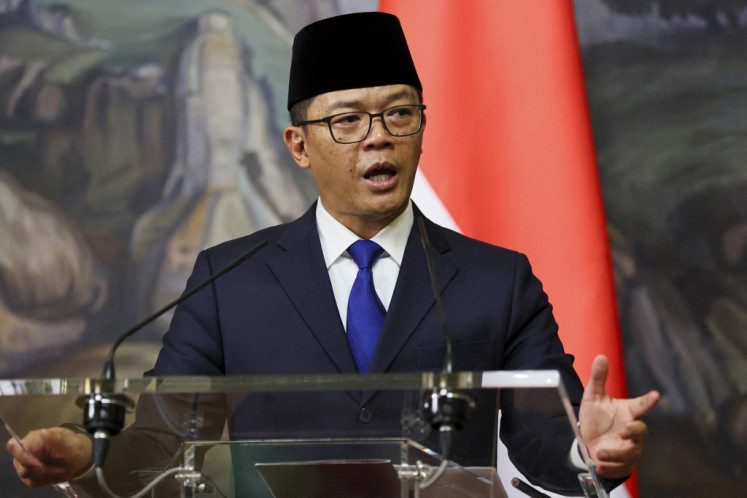Popular Reads
Top Results
Can't find what you're looking for?
View all search resultsPopular Reads
Top Results
Can't find what you're looking for?
View all search resultsDiscourse: 'It is important to strengthen partnerships in Asia and Africa'
Shinzo Abe - Courtesy of Foreign Ministry of JapanLeaders of Asian and African countries will meet in Jakarta on Wednesday and Thursday and in Bandung on Friday to commemorate the 60th anniversary of the 1955 Asian-African Conference
Change text size
Gift Premium Articles
to Anyone

Shinzo Abe - Courtesy of Foreign Ministry of Japan
Leaders of Asian and African countries will meet in Jakarta on Wednesday and Thursday and in Bandung on Friday to commemorate the 60th anniversary of the 1955 Asian-African Conference. Japanese Prime Minister Shinzo Abe has offered his insight in a written interview with The Jakarta Post's Yohanna Ririhena on how Japan contributes to stronger collaboration between Asia and Africa:
Question: Is there any connection between the 10 Bandung Principles and Japan's diplomacy? How do you think Asian and African countries can realize greater cooperation?
Answer: Sixty years ago, a total of 29 countries/regions participated in the Asian-African Conference. We will never forget that Indonesia invited Japan to the conference. Japan has consistently remained a friend of Indonesia since the end of World War II and has regarded cooperation with Indonesia as a top priority.
Many Japanese have visited Indonesia and have been enthralled by the diverse and beautiful island country. Now, Indonesia has achieved significant development. I hear that JKT48 [a Japanese-inspired girl band] has been performing outstandingly in Jakarta. It is great pleasure to be able to visit Indonesia.
The commemoration of the 60th Anniversary of the Asian-African Conference provides an important opportunity to further strengthen relations between Asian and African countries. I would like to express my respect for the leadership that President Joko Widodo has exhibited in holding the commemorative events. I would like to take this opportunity to convey to you Japan's efforts and ideas toward realizing peace and prosperity in this region and confirm cooperation with participating countries.
The environment surrounding Asia and Africa has undergone significant change in the past 60 years. However, the Bandung Spirit around the core ideas of solidarity, friendship and cooperation and the 10 Principles of Bandung that exemplify it still remain the guideline leading to advance the future of Asia and Africa.
Over the past 60 years, Japan has contributed to the peace and stability of international society as a peace-loving nation. In respect for the spirit of the 10 Principles of Bandung, and guided by the ideas of (1) 'Proactive Contribution to Peace' based on the international cooperation principle, (2) abiding respect for the rule of law, and (3) realization of high-quality growth, Japan will contribute even further to the peace, stability, and prosperity of the international community.
Economic relations between Asia and Africa have not developed as expected. How do you think this problem can be overcome and what role can Japan take on to that end?
Today, 60 years after the Asian-African Conference in Bandung in 1955, Asia has become the world's growth center and Africa is achieving remarkable growth as the 'more dynamic continent.' Also, with ever-increasing cross-border movements of people, goods and money between Asia and Africa, the two regions are closely linked economically.
In order to further promote these developments, it is important to strengthen partnerships in Asia and Africa at both government and private-sector levels. Over the past 60 years, Japan has helped infrastructure construction and human resources development in Asian and African regions by providing support through Official Development Assistance (ODA) totaling US$300 billion. Japan also contributed to the economic development of Asia and Africa through private-sector investment and associated employment creation as well as technological transfers. By leveraging our experiences with cooperation in Asia and Africa as well, Japan, as a partner who walks together, will continue to contribute to the development of both Asia and Africa through support via ODA, promotion of trade and investment under the partnership between the public and private sectors and human resources development.
Development issues in Asia and Africa have often been connected with infrastructure. How can relatively developed Asian and African countries contribute with innovative finance and how does Japan intend to contribute? And how can Japan facilitate South-South cooperation?
In order to realize sustained, robust and high-quality growth that benefits everyone, it is necessary to appropriately and effectively respond to vast infrastructure needs in Asia and Africa. Japan will continue to contribute to infrastructure development in Asia and Africa through 'high-quality infrastructure investment' by utilizing various channels of economic cooperation Japan has and also by mobilizing private-sector funds and know-how under partnerships with international institutions such as the World Bank, the Asian Development Bank and the African Development Bank.
Japan has also supported South-South cooperation through 'trilateral cooperation', supporting developing countries' cooperation with other developing countries and support for intraregional cooperation by regional organizations, such as the African Union (AU) and the Association of Southeast Asian Nations (ASEAN). In particular, the TICAD (Tokyo International Conference on African Development) process, which Japan has continued to sponsor over 20 years, has contributed to sharing the achievements of development assistance accumulated in Asia and enhancing the extent of cooperation between Asian and African countries.
For example, Japan and Indonesia have been cooperating in supporting Africa in fields such as education and agriculture, and are now considering further promotion of this bilateral cooperation on the occasion of the commemoration of the 60th Anniversary of the Asian-African Conference in Bandung. The next TICAD meeting is scheduled to be held in an African country. Japan, while taking advantage of its own knowledge in fields such as health care, education and agriculture, will continue to effectively promote and support intraregional cooperation in Africa as well as trilateral cooperation.









